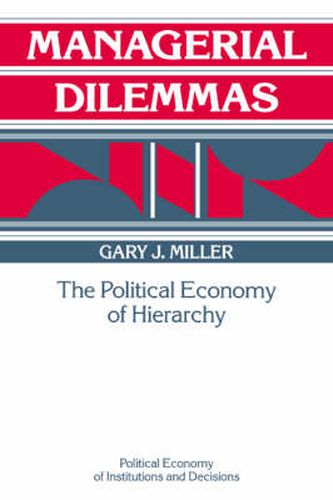Readings Newsletter
Become a Readings Member to make your shopping experience even easier.
Sign in or sign up for free!
You’re not far away from qualifying for FREE standard shipping within Australia
You’ve qualified for FREE standard shipping within Australia
The cart is loading…






In organisation theory a schism has developed between the traditional organisational behaviour literature, based in psychology, sociology and political science, and the more analytically rigorous field of organisational economics. The former stresses the importance of managerial leadership and cooperation among employees, while the latter focuses on the engineering of incentive systems that will induce efficiency and profitability, by rewarding worker self-interest. In this innovative book, Gary Miller bridges the gap between these literatures. He demonstrates that it is impossible to design an incentive system based on self-interest that will effectively discipline all subordinates and superiors and obviate or overcome the roles of political conflict, collective action, and leadership in an organisation. Applying game theory to the analysis of the roles of cooperation and political leadership in organisational hierarchies, he concludes that the organisation whose managers can inspire cooperation and the transcendence of short-term interest in its employees enjoys a competitive advantage.
$9.00 standard shipping within Australia
FREE standard shipping within Australia for orders over $100.00
Express & International shipping calculated at checkout
In organisation theory a schism has developed between the traditional organisational behaviour literature, based in psychology, sociology and political science, and the more analytically rigorous field of organisational economics. The former stresses the importance of managerial leadership and cooperation among employees, while the latter focuses on the engineering of incentive systems that will induce efficiency and profitability, by rewarding worker self-interest. In this innovative book, Gary Miller bridges the gap between these literatures. He demonstrates that it is impossible to design an incentive system based on self-interest that will effectively discipline all subordinates and superiors and obviate or overcome the roles of political conflict, collective action, and leadership in an organisation. Applying game theory to the analysis of the roles of cooperation and political leadership in organisational hierarchies, he concludes that the organisation whose managers can inspire cooperation and the transcendence of short-term interest in its employees enjoys a competitive advantage.